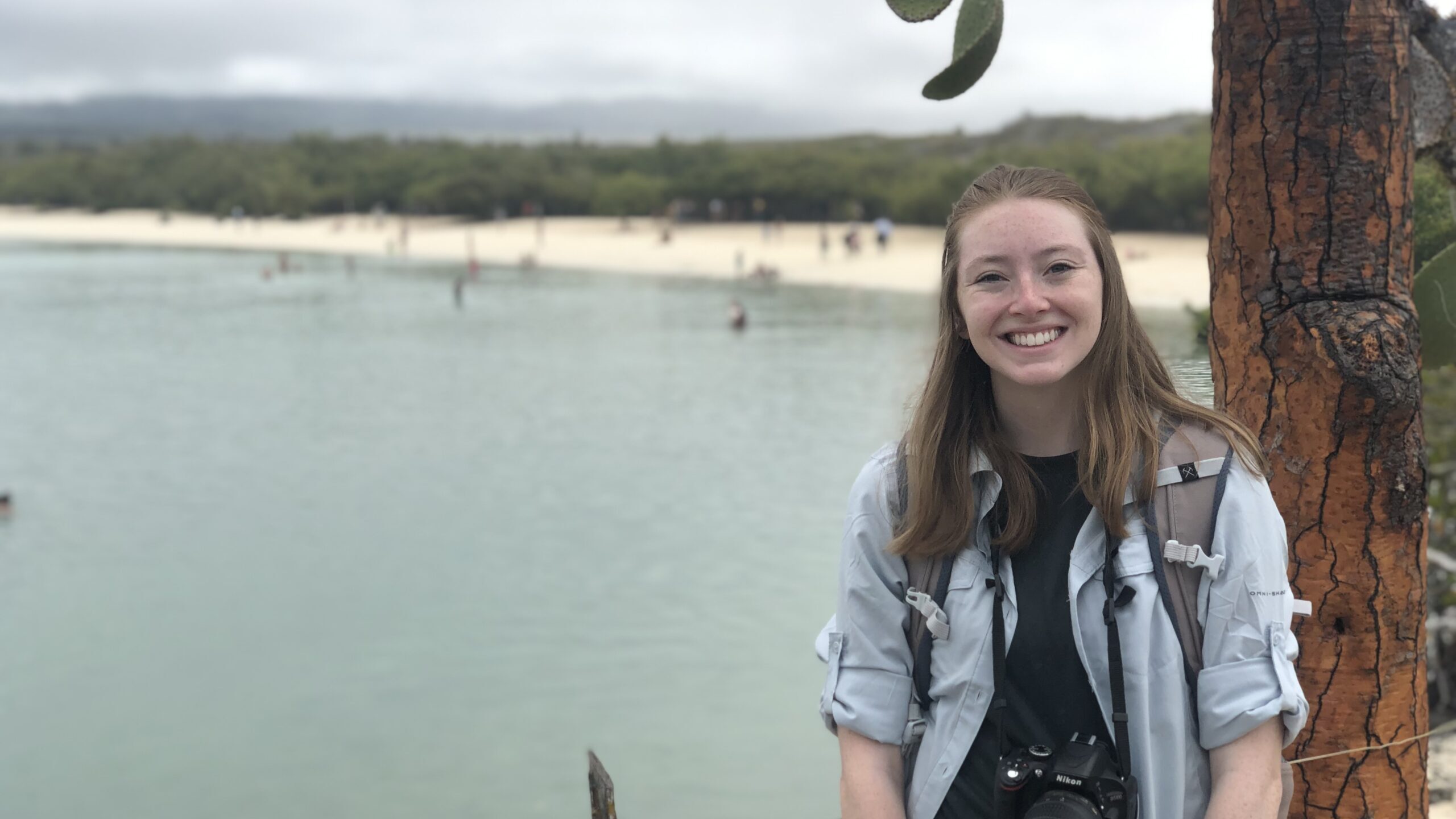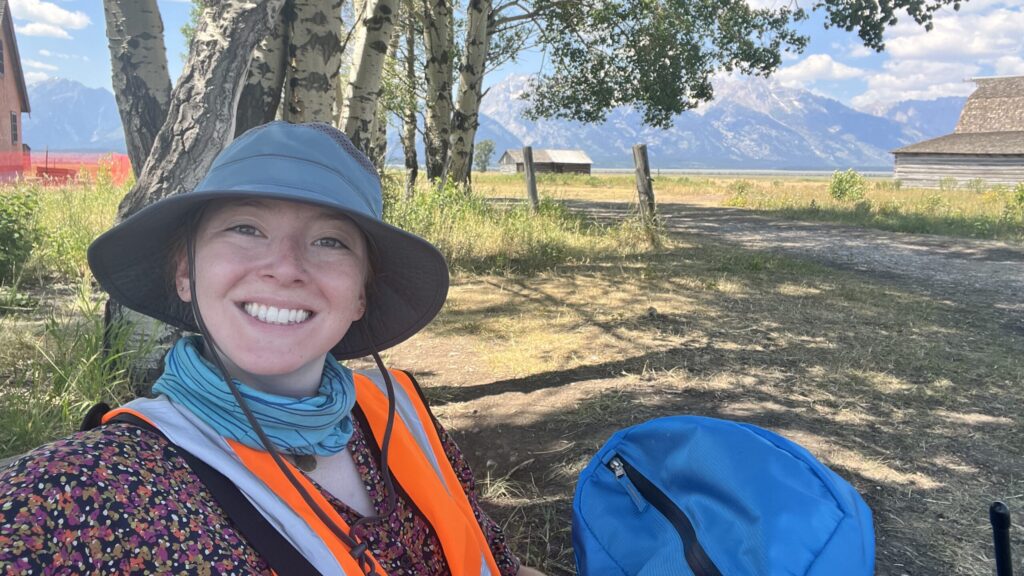Researcher Spotlight – Julianne Reas

2022-23 Global Change Fellow
MS Student, Parks, Recreation, and Tourism Management
Advisor: Dr. Yu-Fai Leung & Dr. Kathryn Stevenson
Every year the Southeast Climate Adaptation Science Center funds a multi-disciplinary cohort of Global Change Fellows representing colleges across NC State University. Here are some highlights about 2022-23 Fellow, Julianne Reas and the applied research she’s conducting.
About You
What do you study?
I’m a social scientist, so I study the human dimensions of natural resource management. My research focuses on better understanding the drivers of conservation action on local and global levels. I’m particularly interested in visitor use management within protected areas, and how we can best utilize social strategies, such as education, to promote connection to nature. I’m currently examining influences on connection to nature formation in two unique contexts, locally in North Carolina elementary schools, and globally within the Antarctic tourism industry. The human-environment relationship is complex, and understanding the most effective influences and drivers of pro-environmental attitudes and behaviors across populations and experiences is crucial for climate action.
What (or who) influenced you to go into this field of study?
While I was an undergraduate student, I spent a summer road tripping around different National Parks, and really connecting with the environment in a way that was new to me. On this trip, I developed a strong passion for conservation and when I returned back to NC State, I was motivated to connect more people to parks. I founded a student organization on campus, ‘The National Parks Club,’ and spent the next 3 years engaging students with the outdoors and conservation issues through camping trips, service, and community events. After both witnessing and personally experiencing the profound ways that experiences in nature changed attitudes, behaviors, and lifestyles, I was drawn to study the human dimensions of natural resource management. Through my position as president, I was fortunate enough to meet some very influential and supportive faculty in the College of Natural Resources that saw my passion and helped me find a path towards the graduate work I’m doing now.
What is your dream job?
Secretary of the U.S. Department of the Interior is definitely my pie-in-the-sky dream job. I think that position is at the level where people-focused, climate-change policy can be prioritized and implemented across agencies and locations. Of course, each agency and protected area has different needs and challenges, but that’s all part of the complex puzzle. Working in a job where I can develop and push forward solutions to global change on both localized and broad levels is the dream.
About Your Research

What results are you finding?
I’ve had such a unique opportunity to explore social science issues related to global change on vastly different scales, and because of this, I have results from two different studies. My first study compared the terms, “nature” versus “the outdoors” using a connection-to-nature scale with fourth and fifth grade students to better understand whether the language we’re using is inclusive among different demographic groups. We found differences in emotional responses, especially for girls, but not in general connectedness, which is really interesting and unexpected! In my second study, I conducted interviews with Antarctic tour guides to validate a conceptual model of protected area ambassadorship, and we’re finding results that confirm the dimensions to explain ambassadorship behavior (place, duty, community, capacity) proposed in the model.
Who will your research benefit?
Connection to nature evaluations, like the one tested in my study, are commonly used by environmental educators to assess and develop their programming. Ensuring the language used in evaluations is culturally responsive will in turn allow programs to be more inclusive, ultimately ensuring that everyone – regardless of background or lived experience – is ready to engage with environmental issues.
How can your research be used to inform management decisions?
My second study critically examined the concept of ambassadorship in protected and natural area conservation by applying a conceptual model to Antarctic tour guiding. Antarctica is a highly climate-change sensitive location that is feeling the impacts of increasing tourism. Guides play an important role in the tourism system, and having data to show their importance in mitigating impacts and influencing visitors, could help inform the self-governed Antarctic tourism industry on how to better utilize these ambassadors.
About Your Global Change Fellow Experience
What has been your favorite part of being a SE CASC Global Change Fellow?
Definitely the opportunity to learn from and connect with other scholars and students all working towards a common goal. It’s been so inspiring to see the multi-disciplinary approaches that people are taking to address climate change.
What advice would you give to a student that is interested in getting involved in your field?
Natural resources is a field that needs people with niche, interdisciplinary interests, because there’s a million different things you could do related to natural resources, and it’s all important. You don’t necessarily have to have it all figured out when you start in this field. Just be open to opportunity, be persistent, and be passionate about what you’re doing. Passion shines through and people see that.
What advice would you give to an incoming Global Change Fellow to get the most out of their experience?
Take advantage of the opportunities presented to you through this fellowship. Get super involved in seminar planning, and don’t be afraid to take the lead on a project that really excites you. You will gain great experience if you allow yourself to prioritize these opportunities.
- Categories:
